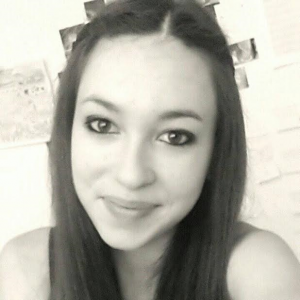Worth Living Ambassador Natalie Volpicelli

Hi! I am Natalie Volpicelli, a rising third year studying Psychology and Economics and minoring in Entrepreneurship at the University of Virginia. All my life I have struggled with anxiety and OCD whether that was paranoia, insomnia, germaphobic, etc. However, five years ago my anxiety, OCD and unattainable strive for perfection manifested in a more physically damaging way: anorexia. Since then, I have had many ups and downs. I needed to come days away from death to realize my worth, but I hope that by sharing my story and new found confidence and strength with others they can use my experiences to see why life is “worth living.”
“It’s Not Me, It’s You”
On the anniversary of FOUR YEARS since I was released from being hospitalized, I decided to share a letter I wrote while there. The prompt was a “letter to my eating disorder.” At the time, a love letter would have been much easier, but I mustered up the courage to write a break up letter (wasn’t quite brave enough to do a face to face one yet… that one happened just about a month ago – better late than never?) While writing this, it was quite hard to believe my words, but I knew that one-day I would. I told myself to read it everyday since it was written to remind myself why I fight.
That didn’t happen.
In fact I got quite lost, while my letter hid away. Rather than taking up the healthy habits I dreamed of, I added depression, bulimia, and self-harm to my repertoire.
Then I found the letter again.
I did not physically hold it in my hand, but mentally the mind frame came back. I found why I fought so hard in the hospital to beat my eating disorder again. I saw all that was lost and dreamed of all I could gain if I just gave up my eating disorder.
And no, that wasn’t just pounds.
It was moments: moments with my family enjoying dinners and holidays together because fighting about one more bite of the famous Volpicelli pasta sauce, rigatoni and meatballs or 1200 Christmas cookies that we spent 3 days making really isn’t worth ruining my favourite holiday or moments with my friends drinking and eating late night snacks while trying to forget the exam we may have failed but still laughing and enjoying every moment because a B really IS NOT the death of me. All the moments began consuming my life rather than my eating disorder.
Finally, I re-joined cheer. I shouldn’t have made the team. It was a highly competitive university squad and I was nowhere near where I was pre-ED…but the coach heard my story and found something in me she liked. If someone I just met believed in me this much to take a girl who falls to her head trying to do a backhand spring now because her arms are now no muscle, no fat, just bone, then why shouldn’t I believe in me? Why shouldn’t I want to prove her right and prove that I am worthy of this spot? And that started with eating. So now, 15 pounds and three months later I am PAST my goal weight and actually revisited this letter, for real.
I can share this and mean it. I can read it and believe it.
So please enjoy this now maybe too highly anticipated break up story…
Dear NED (Natalie’s Eating Disorder),
It’s been a year since you have come into my life. As I look back at this year, I can see all the comfort you have provided me. I was lost when you came and I used you as guidance. I was alone when you came and I used you as a friend. I was confused when you came and I used you as an answer. I was stressed when you came and I used you as relief. And now here we are a year later and you want to celebrate a one-year anniversary. Celebrate a year of artificial peace and a hope for many more years together. But you are wrong. Because here I am, a year later, and I am not the weak girl you met then. I am not “little Natalie,” I am grown up. I never would have believed I could say goodbye to you or my “perfect, ideal” image, but I am ready.
I know you are a creation of my anxiety and perfectionism, but at times you felt so real. All of your promises of “being the best” athlete, student, or person because of your rules seemed so attainable. But in fact, you were like a parasite feeding off me at my most vulnerable point in order to keep yourself alive. You sucked the life out of me. My social life, my concentration, my sanity, my health: all gone within months. Because of you I went from happy and healthy to living a life of paranoia, 16 hour workouts a day with little nutrition, and shivering in ninety-degree weather.
For a year you tricked me into thinking I was nothing and the only way I could be worth love was by listening to you, and suddenly it turned into only wanting to be worth your love, but you never gave it to me. Instead you gave me nothing but lies and hatred. Every time I saw my weight drop 100…90…80…70… you made me feel like I was accomplishing something, making all of my discomfort and health issues seem insignificant. You pushed me around, and fogged the pain with a false hope of happiness. You took advantage of my need to please and longing to be perfect and set the bar to an impossible standard waiting, wishing, and hoping for every failure so you could degrade me. And a year later you want me to sit passively so you can take advantage of me once again. You want me to forget the people who really love me and forget the things that really make me happy and replace true peace with your false sense of sanity and happiness. But I will not let you trick me like that anymore.
Why must you insist on contaminating me? And it is not only me. I see you tearing down my friends and tormenting all of the over-achievers and girls with perfectionism and high-expectations running in their blood…just like me. Everywhere I am, I hear your influence. Every conversation, every commercial, every show is all about being perfect. I have never been one to worry about other’s opinions, but you made me think twice. How did you break through my wall? How did you consume me and turn me into nothing? You made my thoughts seem normal, even “healthy.” Was that your twisted way of controlling me?
You tried to take my talents away from me, ruining everything I get joy out of. School became difficult: instead of studying, I was exercising; instead of focusing on notes, I was focusing on you. Sports were taken away from me. I went from a powerful high-level gymnast to barely able to walk up stairs…an all star cheer captain to a no-muscle, purple-skinned piece of glass, breaking with every hit. You took me away from my friends, and tried to force me to only befriend you. You turned me against my family and mutated my home into endless fights, tears, and shame.
I bet you were upset when I learned how to reach out to others for help, seeking comfort in shared ice creams and laughter rather than the empty stomach and tears you offer. And when I have that extra snack so I can finally cheer again, how betrayed will you feel? Or when I skip a workout to study my way into UVA? I know how furious this will make you, but it will make me finally feel…free.
To be honest, you can try to tear me down and try to keep making your way into my life, but there is no longer room for you.
I am stronger.
I work harder.
I am more than an eating disorder.
I deserve much better than you.
Yes, I was lost and used you for guidance, but now I have my rationality leading the way. Yes, I was alone and used you as a friend, but I have friends and family who love me unconditionally. Yes, I was confused and used you as an answer, but now I have answers that do not cause me physical or emotional damage. Yes, I was stressed and used you as relief, but now I have new ways to find relief. And yes it is a year later and I was attached to you for that whole year, but not anymore. Thank you for helping me see everything I have and everything that makes life worth living, but your purpose was served and it is time for me to move on. I know who loves me, I know what makes me happy, and I know I do not need you.
Goodbye and So Long, Natalie






